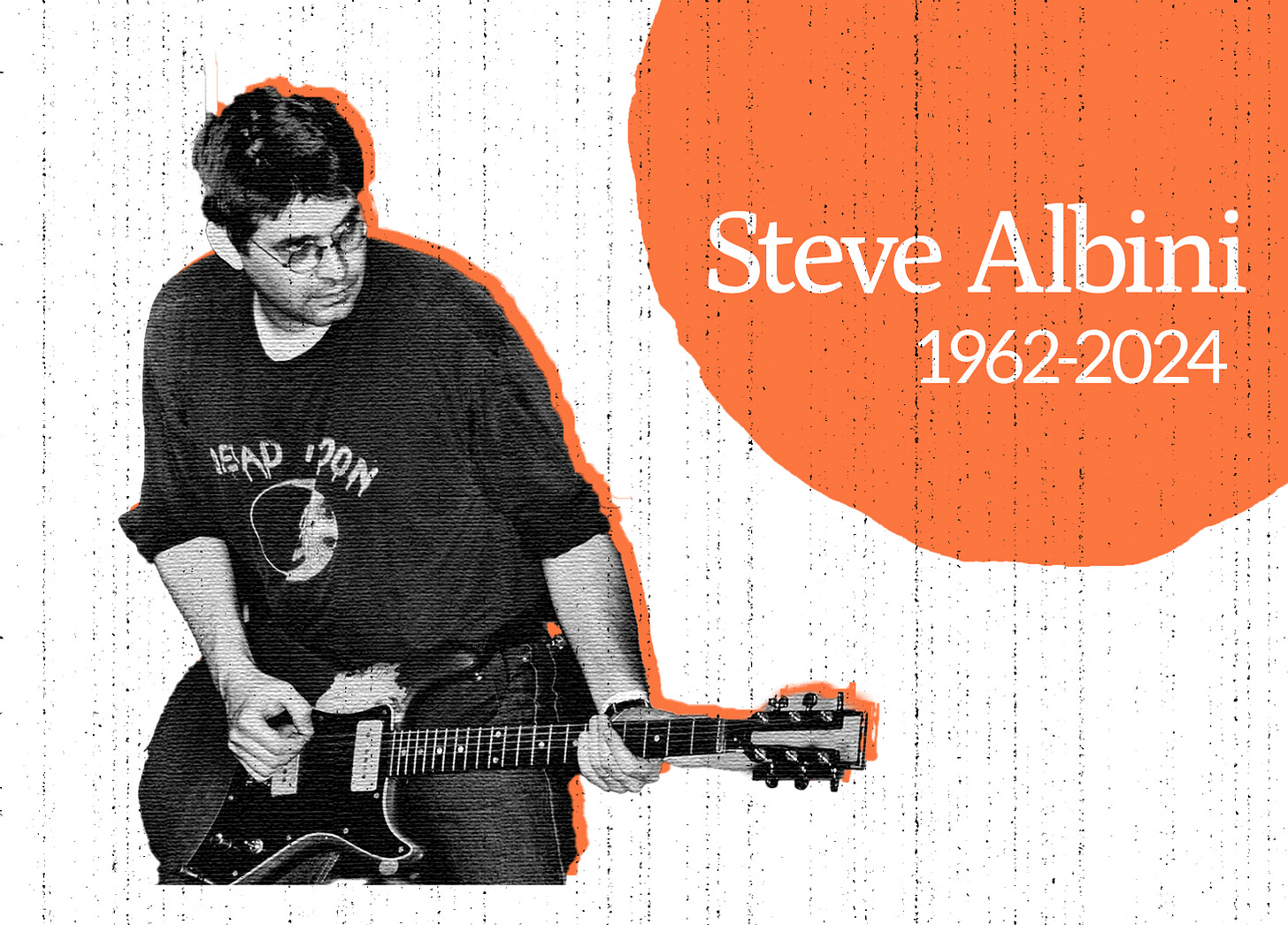Steve Albini 1962-2024
GH on a master soundscaper.
In 1987, when I was reviewing records at The Age, the guys at Au-Go-Go gave me a copy of Big Black’s Songs About Fucking. When I filed something suitably awestruck, it caused a minor contretemps, not just about the title, but about whether we should be reviewing records so avowedly anti-social at all.
Needless to say, possessed of a twenty-one-year-old’s militance, I fought my corner vigorously, and a few asterixes did the trick. But the humour of it didn’t elude me either: this was surely the kind of irritation Steve Albini had had in mind when he named the record, only to undercut it immediately by breaking up the band on the grounds it was too close to success. There was no point standing with Steve. He’d already moved on by the time you got there.
‘Steve Albini!’ said the text from a friend this morning. ‘Oh no,’ I gasped. The ABC summarises here and Rolling Stone has a useful survey of his most memorable production credits. Albini was only sixty-one, but they’d been long years - fortunately, fertile as well. Because has anyone had such an impact on the indie soundscape of the last forty years?
What makes it even better is that Albini would have hated the idea of being the George Martin or Phil Spector of his era and genre. I loved that he deprecated the title ‘producer’ in favour of ‘engineer’, being there to do a job of work, to be a good tradesman rather than a showman. I loved that he derided Nirvana as ‘REM with a fuzzbox’ and The Pixies as ‘blandly entertaining college rock’ after working with both, yet at the same time was as close as anyone around to a bona fide guarantor of quality. He was the guy who told Slint: ‘I don't think you guys will ever get big, but you'll be really influential.’ He was the guy who recognised Kim Deal’s exquisite all-American voice in The Breeders: 'I think she is a genius and she thinks about music in a unique way.’ He gave us the minimalism of PJ Harvey’s Rid of Me, the maximalism of Jesus Lizard’s Goat, and all points between; he gave us so fucking much.
Still, those records of his own, eh? Big Black probably reached their apotheosis with Songs About Fucking, but almost everything in their catalogue still withstands endless repetition. Drum machines were just starting to make drummers redundant in dance music, but Big Black’s Roland proved their versatility by going off like the gatling gun in The Wild Bunch. All of it overlaid with Albini’s distinctive guitar, rendered unmistakable by his trademark metal pick, and twisted by his macabre subject matter, from the ennui of ‘Kerosene’ to the sadism of ‘Fists of Love’.
What’s your favourite? The headlong drive of ‘Bazooka Joe’ and L Dopa’? The spoken word-ish stuff like ‘Deep Six’ or ‘Things to Do Today’ ? Like all my favourite bands, they did revelatory covers: Kraftwerk’s ‘The Model’, Cheap Trick’s ‘He’s a Whore’, Wire’s ‘Heartbeat’, and, maybe best of all, James Brown’s ‘The Big Payback’, where the soul has been supplanted by a massive sonic wallop, bringing out all the song’s latent violence and intimidation. And who hasn’t, in a personal slump, turned Shellac’s ‘Prayer to God’ up to 11?
No wonder people wanted to record with Albini, especially after he lent his misanthropic cred to The Pixies’ Surfer Rosa. There were misses as well as hits, but from their associations Nirvana got ‘Frances Farmer Will Have Her Revenge on Seattle’, Superchunk ‘Skip Steps 1 & 3’, The Auteurs ‘Unsolved Child Murder’, Silkworm ‘Treat the New Guy Right’ and The Cloud Nothings ‘Fall In’. FWIW, although they both disowned them, I also liked Albini’s sessions with Fugazi for In On The Kill Taker. He discusses them with Ian Mackaye here.
Just as stirring were Albini’s periodic denunciations of this, that and everything, the most famous of which, ‘The Problem With Music’, is as relevant thirty years later as it was at the time. As Jeremy Gordon says in The Atlantic: ’To a certain kind of listener, it sometimes felt like he [Albini] was the last honest musician in the industry.’ In recent years, he recanted some of his earlier views, but I liked that too. In these timid times, maybe it would be better if we called it first more often even if it entailed apologising later. You don’t want to regret what you don’t get round to saying, in the way I now regret not getting round to reviewing Budd by Rapeman even though I probably wouldn’t have been allowed to.




I was shaken up by this news, Steve Albini was one of the few true heroes I had left. As a musician, as a man, he stood for so many things I admire. Shellac were the band for me, I saw them 5 times and had tickets to see them in Manchester in a couple of weeks.
I sort of understood people's impulse to share the great records he had engineered on, but was left slightly baffled by it; as you said, he saw himself as a tradesman. Far better were the constant stream of genuinely hilarious quotes, barbs, witticisms, essays, letters to the editor. The man had more than one great book in him, I am sure of that.
And best still were the Shellac songs, spanning over 30 years but all of a piece because of that scratching, iridescent guitar tone. I think the Billiard Player Song from one of the first E.Ps is among the best rock songs ever written, at once bitter and wistful and caustic and heartbreaking - it is sui generic, like the man who wrote it.
FYA Read the Uncompromising Letter That Steve Albini (RIP) Wrote to Nirvana Before Producing In Utero (1993)
https://www.openculture.com/2024/05/read-the-uncompromising-letter-that-steve-albini-rip-wrote-to-nirvana-before-producing-in-utero-1993.html